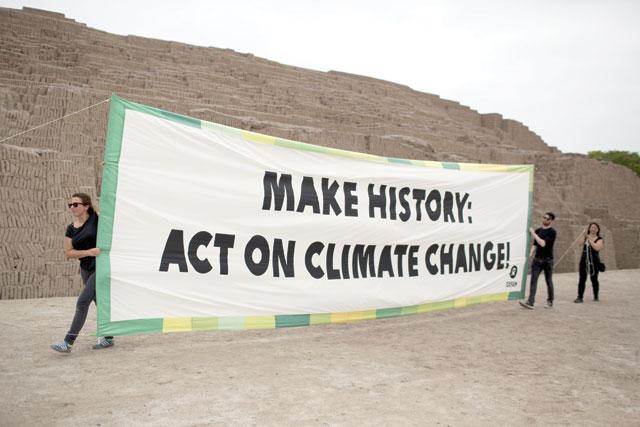You are here
2014 poised for hottest year on record — UN
By AFP - Dec 03,2014 - Last updated at Dec 03,2014

LIMA — This year may end as the hottest on record, the UN’s weather agency said Wednesday as it recounted a tale of rising seas, crippling droughts and floods since January.
“The year 2014 is on track to be one of the hottest, if not the hottest, on record,” the World Meteorological Organisation (WMO) reported on the sidelines of the UN climate talks in Lima.
Provisional data for 2014 shows that 14 out of the 15 warmest years on record have all occurred in the 21st century, it added.
“There is no standstill in global warming,” WMO chief Michel Jarraud said in a press statement.
“What we saw in 2014 is consistent with what we expect from a changing climate. Record-breaking heat combined with torrential rainfall and floods destroyed livelihoods and ruined lives,” he said.
“What is particularly unusual and alarming this year are the high temperatures of vast areas of the ocean surface, including in the northern hemisphere.”
The global average air temperature over land and sea surface for January to October was about 0.57OC above the average of 14OC for a reference period from 1961-1990, the WMO said.
It was 0.09OC above the average for the decade 2004-2013.
“If November and December maintain the same tendency, then 2014 will likely be the hottest on record, ahead of 2010, 2005 and 1998,” the WMO said.
“This confirms the underlying long-term warming trend.”
The interim report for 2014 aims at guiding 195 countries striving for a global climate change pact, due to take effect by 2020.
At the deal’s centre is a roster of national pledges to roll back carbon emissions — invisible, heat-trapping gases released by burning coal, oil and natural gas.
“Our climate is changing and every year, the risks of extreme weather events and impacts on humanity rise,” said Christiana Figueres, head of the UN Framework Convention on Climate Change staging December 1-12 talks in Lima to draft the outlines of the pact.
It must be signed in Paris in December 2015, and will seek to meet a UN target to limit warming to 2OC over pre-industrial levels.
The WMO said the sea surface temperature for the year so far was the highest on record — about 0.45OC above the 1961-1990 average.
It was particularly high in the tropical Pacific, approaching, but not triggering, the threshold for the destructive El Nino weather phenomenon.
For January to June, ocean heat measured to depths of 700 and 2,000 metres were both the highest on record, reflecting the ocean’s role in absorbing heat from the warming atmosphere.
Heatwaves, floods, drought
Other highlights from the statement:
— Heatwaves occurred in South Africa, Australia and Argentina in 2014, while exceptional cold waves occurred in the United States in winter, in Australia in August and in Russia in October.
— Sea levels in early 2014 reached a record high for the time of year, driven by thermal expansion as the oceans warmed and runoff from melting icesheets and glaciers.
— Flooding struck Britain, parts of the Balkans, Argentina, Russia and the southeastern and eastern US. In August and September, millions of people were hit by flooding in northern Bangladesh, northern Pakistan and India.
— Severe drought gripped the southern part of northeastern China, and parts of the Yellow River and Huaihe River basins failed to get even half of the summer average rainfall.
Worrying rainfall deficits were reported in parts of central America, central Brazil and the city of Sao Paulo, as well as parts of California, Nevada and Texas and the Australian states of New South Wales and Queensland.
— On the positive side, tropical cyclone activity has been below normal, so far. As at November 13, 72 tropical storms were recorded, fewer than the 1981-2010 average of 89.
On November 20, the US National Oceanic and Atmospheric Administration said global temperatures in October, as well as for the entire year so far, were the hottest on average since record-keeping began in 1880.
The Nobel-winning Intergovernmental Panel on Climate Change, in a massive report finished this year, said warming on current emission trends was on track for roughly double the UN target.
Related Articles
Factfile on 2013, described by the UN's World Meteorological Organisation (WMO) as a year of extreme heat and weather events:
GENEVA — Climate change sparked a trail of extreme weather and record heat in 2024, the United Nations said on Monday, urging the worl
GENEVA — Global temperatures “smashed” heat records last year, as heatwaves stalked oceans and glaciers suffered record ice loss, the United















